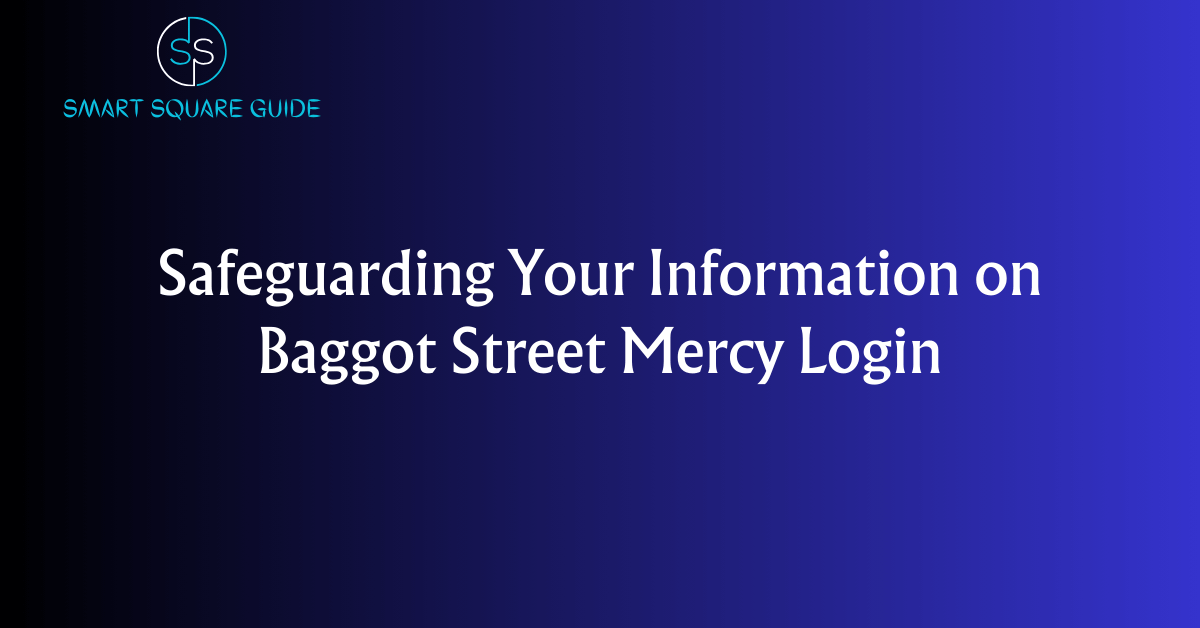Safeguarding Your Information on Baggot Street Mercy Login
In the era of digital connectivity, where a wealth of information is available at the touch of a button, the paramount concern is ensuring the security of sensitive data. This concern is central to Baggot Street Mercy Login users, a gateway to valuable information and resources. In this article, we will embark on a comprehensive journey through the intricacies of information security. We’ll explore why it should be your top priority when using Baggot Street Mercy Login and how you can actively protect your data.

Understanding Baggot Street Mercy Login
Baggot Street Mercy Login, at its core, is a portal that grants access to an array of valuable information about Baggot Street and its resources. Whether you are an individual seeking personal data or an organization accessing critical business information, this portal bridges the digital realm’s wealth of knowledge. Understanding its purpose and significance is the first step toward safeguarding its treasures.
The Growing Concern of Information Breaches
Recent years have witnessed an alarming surge in data breaches across various platforms. This disturbing trend is a stark reminder of the vulnerability of digital information. Cybercriminals are constantly devising new tactics to infiltrate and exploit vulnerabilities in online systems, putting individuals and organizations at risk. To comprehend the gravity of this concern, let’s delve deeper into the reasons behind this surge and its far-reaching implications.
Why Security Should Be a Top Priority
The repercussions of a data breach can be nothing short of catastrophic. Financial losses, compromised personal information, tarnished reputations, and legal ramifications are just a few of the devastating consequences that can arise from a security breach. Thus, prioritizing security is not merely an option but an absolute necessity in today’s interconnected world.
Effective Password Management
One of the initial lines of defence in online security is creating and managing robust passwords. A strong password can act as a formidable barrier against unauthorized access. It’s not merely choosing a complex combination of characters; it’s about implementing effective password management practices. Let’s explore the intricate world of passwords and discover the techniques to create secure and unique ones and manage them effectively.
Two-factor authentication (2FA)
While strong passwords are a significant step toward fortifying digital security, they may not be foolproof. This is where Two-Factor Authentication (2FA) comes into play. 2FA is a powerful tool that adds an extra layer of security to your online accounts, including your Baggot Street Mercy Login. We’ll delve into the inner workings of 2FA and elucidate why it’s an invaluable addition to your security arsenal.
Phishing Awareness
Phishing is a ubiquitous threat in the digital landscape. Cybercriminals craft convincing disguises to trick unsuspecting users into divulging sensitive information. Recognizing phishing attempts and navigating through the treacherous waters of deceptive emails and websites require a keen eye and an understanding of their deceptive tactics. Let’s embark on a journey to enhance your phishing awareness and bolster your defences.
Regular Software Updates
Software and applications serve as the digital backbone of your online activities. However, they are not impervious to vulnerabilities. Outdated software can be a breeding ground for security exploits. Therefore, staying diligent with regular software updates is imperative. We’ll shed light on the importance of these updates and guide you in keeping your digital toolkit current.
Securing Personal Devices
In today’s mobile-driven world, personal devices such as smartphones, tablets, and laptops play a pivotal role in accessing online portals like Baggot Street Mercy Login. However, these devices are not immune to threats. Ensuring their security is paramount to safeguarding your digital presence. We’ll explore strategies and best practices to fortify your devices against potential threats.
Data Encryption
Data encryption is a formidable shield that can safeguard sensitive information during transmission. It scrambles your data into an unreadable format, rendering it useless to prying eyes during its journey across the internet. Understanding the mechanics of data encryption and how it contributes to your online security is crucial. Join us in demystifying encryption and its role in preserving the confidentiality of your information.
Employee Training and Awareness
The responsibility of maintaining security doesn’t rest solely on the shoulders of IT professionals. Every employee within an organization plays a vital role in creating a secure environment. To accomplish this, comprehensive employee training and awareness programs are indispensable. We’ll explore how fostering a culture of security awareness can fortify the collective defence against cyber threats.
Incident Response Plan
Preparation is the cornerstone of effective security management. Anticipating and planning for the worst-case scenario is essential. An incident response plan is your roadmap for addressing security breaches efficiently and minimizing damage. We’ll guide you through the critical elements of creating a robust incident response plan.
Security Audits and Assessments
Proactive security measures are essential for staying ahead of potential threats. Regular security audits and assessments provide insights into your digital defences’ strengths and weaknesses. These evaluations help you identify vulnerabilities and take corrective actions before exploiting them. We’ll elucidate the significance of these assessments in maintaining a resilient security posture.
User Responsibility
Users are not passive bystanders in the realm of security. They are active participants, each with a role in maintaining a secure digital environment. We’ll discuss how users can contribute to a safer online landscape by following best practices, staying vigilant, and promptly reporting suspicious activities.
FAQ’s
Why is Baggot Street Mercy Login security essential?
Baggot Street Mercy Login security is essential to protect the confidentiality, integrity, and availability of sensitive information and resources within the Baggot Street Mercy system. It ensures that only authorized individuals can access the system, reducing the risk of unauthorized access, data breaches, and potential user harm. Strong security measures also help build trust among users, reinforcing the system’s credibility.
What can I do to enhance my Baggot Street Mercy Login security?
To enhance your Baggot Street Mercy Login security, you can:
Use strong and unique passwords: Create complex passwords that combine letters, numbers, and special characters, and avoid using easily guessable information like birthdays or names.
Enable two-factor authentication (2FA): Activate 2FA to add an extra layer of security by requiring a secondary verification method, such as a code sent to your mobile device.
Keep your login credentials confidential: Never share your username and password with others, and be cautious of phishing attempts that may trick you into revealing your login information.
Regularly update your password: Change your password periodically and avoid reusing old passwords.
Monitor your account activity: Regularly review your login history and report any suspicious or unauthorized access to system administrators.
Install and update security software: Use antivirus and anti-malware software and keep it up to date to protect your device from threats.
Educate yourself: Stay informed about common security threats and best practices to avoid falling victim to scams or cyberattacks.
Why should employees be involved in security efforts?
Employees should be involved in security efforts because they are often the first line of defence against cyber threats. Their awareness, vigilance, and adherence to security policies and practices can significantly reduce the risk of data breaches and security incidents. Engaging employees in security efforts helps create a culture of security within the organization, where everyone protects sensitive information and assets.
What is the role of data encryption in online security?
Data encryption is a fundamental component of online security. It involves converting data into a scrambled format (cypher) that can only be deciphered with the appropriate decryption key. The role of data encryption in online security includes:
Confidentiality: Encryption ensures that even if unauthorized parties intercept data, they cannot read or make sense of the encrypted content without the decryption key.
Data integrity: Encryption helps verify that data has not been tampered with during transmission or storage. Any unauthorized changes to encrypted data will render it unreadable.
Authentication: Encryption can be used to authenticate the identity of the sender or recipient of encrypted data, ensuring that it reaches the intended party.
Regulatory compliance: Many data protection regulations require encryption to safeguard sensitive information, such as personally identifiable information (PII) and financial data.
Data encryption helps protect sensitive information from data breaches, eavesdropping, and unauthorized access, making it a crucial element of online security.
How do security audits benefit users and organizations?
Security audits benefit both users and organizations in several ways:
Identifying vulnerabilities: Security audits help uncover weaknesses in an organization’s security infrastructure, software, and processes. By addressing these vulnerabilities, organizations can reduce the risk of security breaches.
Compliance: Audits ensure that organizations follow industry best practices and regulatory requirements. This helps maintain legal compliance and avoid potential fines or penalties.
Enhancing user trust: Users are more likely to trust organizations that demonstrate a commitment to security through regular audits. It reassures them that their data is being handled responsibly.
Improved incident response: Audits can uncover gaps in incident response plans, allowing organizations to refine their procedures for detecting, responding to, and mitigating security incidents.
Cost savings: By identifying and addressing security issues proactively, organizations can avoid the potentially significant costs associated with data breaches, legal action, and reputational damage.
Continuous improvement: Security audits provide a feedback loop that allows organizations to improve their security measures and adapt to evolving threats continuously.
In summary, security audits are a valuable tool for assessing and enhancing an organization’s security posture, ultimately benefiting users and the organization by reducing risks and building trust.
